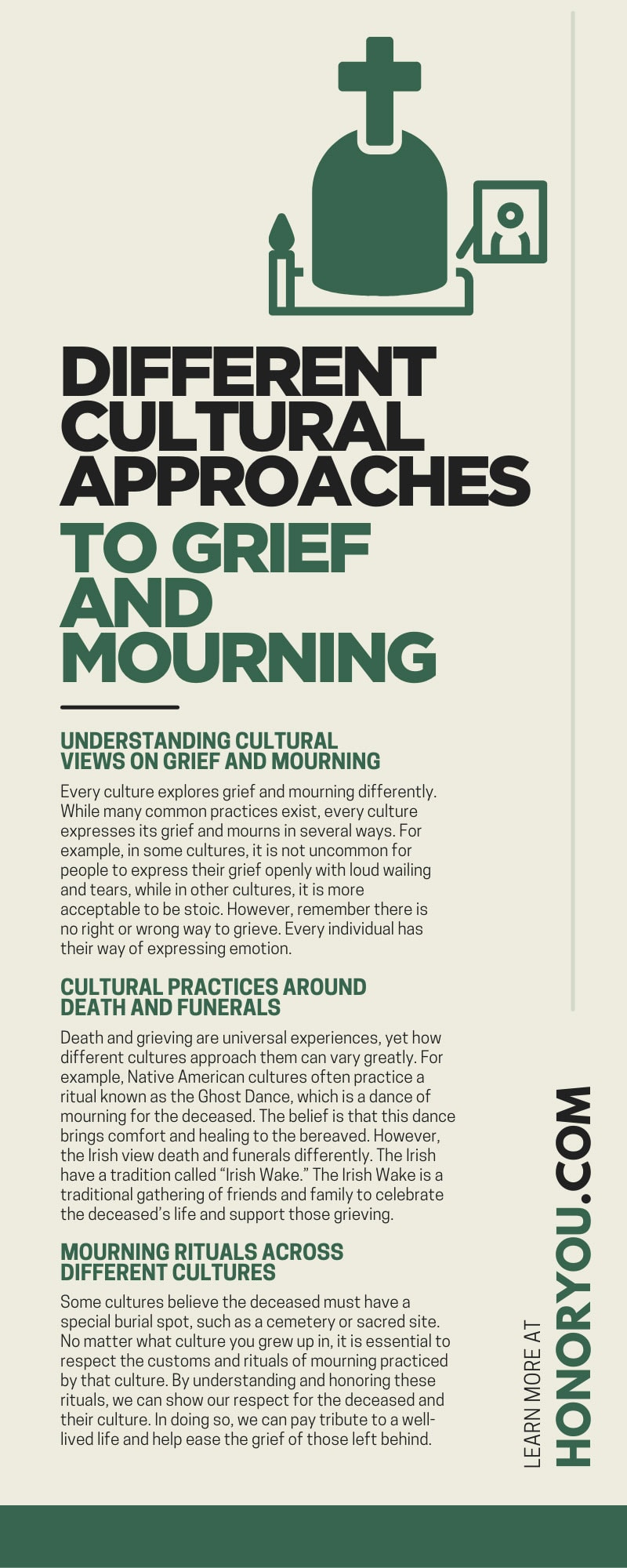Different Cultural Approaches to Grief and Mourning

5 Ways To Take Care of Yourself While Coping With Grief
June 14, 2023
A Brief Guide to Memorial Service Etiquette
July 14, 2023Grief and mourning are universal experiences, yet how various cultures express and experience grief differs worldwide. Cultural practices and rituals can shape how we grieve, as can our emotions and personal experiences. Understanding the different cultural approaches to grief and mourning can help us better understand and honor our grief experiences and those around us. It is essential to recognize that every culture has its unique way of expressing grief, so respecting each culture’s approach, including one’s own, is essential.
Understanding Cultural Views on Grief and Mourning
Every culture explores grief and mourning differently. While many common practices exist, every culture expresses its grief and mourns in several ways. For example, in some cultures, it is not uncommon for people to express their grief openly with loud wailing and tears, while in other cultures, it is more acceptable to be stoic. However, remember there is no right or wrong way to grieve. Every individual has their way of expressing emotion.
Understanding how other cultures approach grief and mourning can be a powerful tool for those grieving, as it can help them better understand their feelings and emotions. By exploring different cultural approaches to grief and mourning, we can better appreciate how people cope with loss.
Cultural Practices Around Death and Funerals
Death and grieving are universal experiences, yet how different cultures approach them can vary greatly. For example, Native American cultures often practice a ritual known as the Ghost Dance, which is a dance of mourning for the deceased. The belief is that this dance brings comfort and healing to the bereaved. However, the Irish view death and funerals differently. The Irish have a tradition called “Irish Wake.” The Irish Wake is a traditional gathering of friends and family to celebrate the deceased’s life and support those grieving.
In a more general sense, national cultures view mourning and grief differently. In some countries, the mourning period can last for a year or more, while it may only last a few weeks in others. Some cultures may have specific rituals to honor the deceased, while others may have more elaborate ceremonies to commemorate the deceased’s life. Every culture is unique in its mourning and grieving practice, so it’s vital to remember that grief and mourning are natural and necessary processes.
Mourning Rituals Across Different Cultures
Mourning and grief are universal experiences, but the rituals and customs surrounding them vary significantly across cultures. It is essential to be aware of how other cultures approach mourning and to honor the deceased in a way that is meaningful to them. Different cultures have different rituals for mourning. For example, some cultures observe the death of a loved one with a period of mourning, and the family wears special clothing or jewelry to honor the deceased. In other cultures, the mourning period might involve a large gathering of family and friends, with traditional music and food.
Some cultures believe the deceased must have a special burial spot, such as a cemetery or sacred site. No matter what culture you grew up in, it is essential to respect the customs and rituals of mourning practiced by that culture. By understanding and honoring these rituals, we can show our respect for the deceased and their culture. In doing so, we can pay tribute to a well-lived life and help ease the grief of those left behind.
How Cultures Throughout History Approached Grieving and Mourning
Throughout history, cultures worldwide have had unique grief and mourning approaches. The mourning rituals have varied drastically, from the ancient Egyptians to the indigenous peoples of the Americas. In ancient Egypt, mummification was a common practice for preserving the dead, and even today, some cultures continue to practice such embalming methods.
Cultures often keep to their traditions, including hosting festivals to honor the dead—think of the Day of the Dead or Dia de los Muertos in Mexico. The Mexican culture views this period as a time to reflect on memories of recently departed family and friends. Most families may offer their passed loved ones their favorite foods, jewelry, or photographs.
Some cultures even celebrate the deceased with festivals and feasts, as they accept grief as a part of life and view death and mourning as sacred experiences. Some cultures expect those who are grieving to move on quickly and not dwell on their pain. Remember that each culture has its unique approach to grief and mourning; it is essential to respect these differences.
How To Respectfully Engage With Another Culture
Many may respect cultural grieving practices by observing from afar, but you don’t have to do that. You can respectfully engage with another culture’s mourning practices and traditions to develop better respect and mindfulness of their practices. For example, some cultures may have specific funeral rites or mourning rituals that involve the whole family or community, while others may have more individualized ways of expressing grief.
It is essential to be aware of and sensitive to the cultural practices of others when mourning the death of a loved one. It’s never right to mock another when participating in a ritual. Take the time to learn your friend or family’s cultural beliefs surrounding grief and mourning so you can approach the process respectfully. By engaging respectfully with another culture’s mourning traditions, we can honor the memory of the deceased and demonstrate our respect for the culture and its beliefs.
As previously mentioned, grief and mourning are universal experiences that cultures express differently. Every culture has ways to honor the dead, from planning casket decorations, such as photos, flowers, and favorite items, to planning burial rituals and holding prayer services at wakes. Grief and mourning are universal feelings, but cultures host different customs that help them connect with the deceased on a deeper, more personal level that we should respect and honor.
It is essential to be mindful of different cultural approaches to grief and mourning and open to learning more about them. Everyone’s journey through grief is unique and deserves acknowledgment and validation. As we honor our own grief experiences, we can also honor the grief of others and create a more compassionate and understanding world. Let Honor You help celebrate your cultural customs with personalized funeral cards, casket pictures, and more. Let our services fit your grief and mourning needs during this difficult time.



